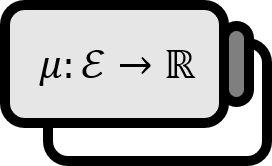Conditions for a Function with Extended Real Values to be Measurable
Theorem1
The necessary and sufficient condition for a function $f : X\rightarrow \overline{\mathbb{R}}$ with values in the extended real numbers to be measurable is as follows, given that σ-algebra $(X,\mathcal{E})$.
$$ f\text{ is measurable} \iff \begin{align} & \left\{ x \in X : f(x)=-\infty \right\} \in \mathcal{E} \\ & \left\{ x \in X : \alpha < f(x) < +\infty \right\} \in \mathcal{E}\quad (\forall \alpha \in \mathbb{R}) \end{align} $$
Explanation
The theorem above is useful for determining whether functions taking extended real number values are measurable when dealing with measurable functions that take extended real number values.
Proof
Lemma
Let’s say a function $f : X \rightarrow \overline{ \mathbb{R} }$ taking values in the extended real numbers is $\mathcal{E}$-measurable. Then, the following two equations hold.
$$ \begin{align*} \left\{ x \in X : f(x) = +\infty \right\} &= \bigcap_{n=1}^{\infty} \left\{ x \in X : f(x)>n \right\} \in \mathcal{E} \\ \left\{ x \in X : f(x)=-\infty \right\} &= \left[ \bigcup_{n=1}^\infty \left\{ x \in X : f(x) >-n \right\}\right]^c \in \mathcal{E} \end{align*} $$
$(\implies)$
Since $f$ is measurable by the lemma, the following holds.
$$ \left\{ x \in X : f(x)=-\infty \right\} \in \mathcal{E} $$
Hence, $(1)$ holds. For any $\alpha \in \mathbb{R}$, the following holds.
$$ \left\{ x \in X : \alpha < f(x) < +\infty \right\}= \left\{ x \in X : \alpha < f(x) \right\} \cap \left\{ x \in X : f(x)<+\infty \right\} $$
It’s clear that the first set on the right side is an element of $\mathcal{E}$. For the second set, the following holds so it is an element of $\mathcal{E}$.
$$ \left\{ x \in X : f(x)<+\infty \right\}=\bigcup_{n=1}^\infty \left\{ x \in X\ :\ f(x)<n \right\} \in \mathcal{E} $$
By the definition of a $\sigma$-σ-algebra, the following holds.
$$ \left\{ x \in X : \alpha < f(x) <+\infty \right\} \in \mathcal{E} $$
Therefore, $(2)$ is satisfied.
■
$(\impliedby)$
As per the definition of a measurable function, it suffices to show that for any $\alpha \in \mathbb{R}$, $\left\{ x \in X : f(x) > \alpha \right\} \in \mathcal{E}$ holds. For any $\alpha \in \mathbb{R}$, the following holds.
$$ \left\{ x \in X : f(x) < +\infty \right\}= \left\{ x \in X : -\infty < f(x) < +\infty \right\} \cup \left\{ x \in X : f(x)=-\infty \right\} $$
The second set on the right side is an element of $\mathcal{E}$ by assumption. Also, the following holds.
$$ \left\{ x \in X : -\infty< f(x) <+\infty \right\} = \bigcup_{n=1}^\infty \left\{ x \in X : -n < f(x) <+\infty \right\} \in \mathcal{E} $$
Thus, the first set on the right also turns out to be an element of $\mathcal{E}$. Since a $\sigma$-σ-algebra is closed under union, the following holds.
$$ \left\{ x \in X : f(x) <+\infty \right\} \in \mathcal{E} $$
Also, since a $\sigma$-σ-algebra is closed under complementation, the following holds.
$$ \left\{ x \in X : f(x)=+\infty \right\}= \left[ \left\{ x \in X : f(x) <+\infty \right\} \right]^c \in \mathcal{E} $$
Given that $\left\{ x \in X : \alpha<f(x) <+\infty \right\} \in \mathcal{E}$ and a $\sigma$-σ-algebra is closed under union, the following holds.
$$ \left\{ x \in X : f(x) > \alpha \right\} = \left\{ x \in X : \alpha<f(x) <+\infty \right\} \cup \left\{ x \in X : f(x)=+\infty \right\} \in \mathcal{E} $$
Therefore, $f$ is measurable.
■
Robert G. Bartle, The Elements of Integration and Lebesgue Measure (1995), p11-12 ↩︎
